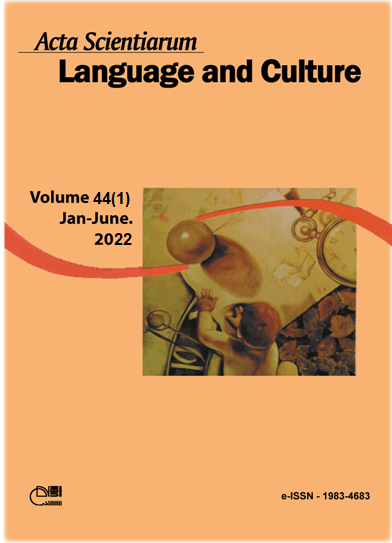Os processos na atividade de escrita: estudo com base na escrita colaborativa
Resumo
Neste artigo, adotamos uma perspectiva funcional, baseada na estrutura experiencial do sistema de transitividade proposto pela Linguística Sistêmico-Funcional (LSF). De acordo com esta perspectiva, consideramos no estudo as diversas esferas contextuais que envolvem o processo de escrita, desde o contexto imediato da situação ao contexto alargado de cultura, e tomamos como unidade de análise cada processo, expresso pelo verbo, à volta do qual se organiza a oração, enquanto unidade de configuração experiencial. O objetivo do estudo consiste em verificar a existência de progressão quanto à configuração experiencial do processo de escrita dos alunos do ensino básico português, revelada pelos processos que emergem no discurso durante a escrita colaborativa. Foram analisadas as transcrições da interação em grupo, em diferentes anos de escolaridade (do segundo ao oitavo ano). A análise focou-se na frequência e peso relativo da distribuição dos processos pelos diversos níveis contextuais e pelos diferentes tipos de processos segundo a categorização da LSF (materiais, relacionais, mentais, verbais, comportamentais e existenciais). Os resultados não evidenciam diferenças entre os níveis de escolaridade quanto ao peso dos diferentes tipos de processo, mas revelam um peso crescente do contexto alargado, ao qual os alunos vão buscar o conhecimento de conteúdo a integrar no texto e das características do gênero textual, e também o peso crescente dos processos ligados à gênese textual. Esta progressão aponta para o potencial de estratégias que alarguem o conteúdo ativado e as formulações consideradas no processo de escrita.
Downloads
DECLARAÇÃO DE ORIGINALIDADE E DIREITOS AUTORAIS
Declaro que o presente artigo é original, não tendo sido submetido à publicação em qualquer outro periódico nacional ou internacional, quer seja em parte ou em sua totalidade.
Os direitos autorais pertencem exclusivamente aos autores. Os direitos de licenciamento utilizados pelo periódico é a licença Creative Commons Attribution 4.0 (CC BY 4.0): são permitidos o acompartilhamento (cópia e distribuição do material em qualqer meio ou formato) e adaptação (remix, transformação e criação de material a partir do conteúdo assim licenciado para quaisquer fins, inclusive comerciais.
Recomenda-se a leitura desse link para maiores informações sobre o tema: fornecimento de créditos e referências de forma correta, entre outros detalhes cruciais para uso adequado do material licenciado.




















6.png)









